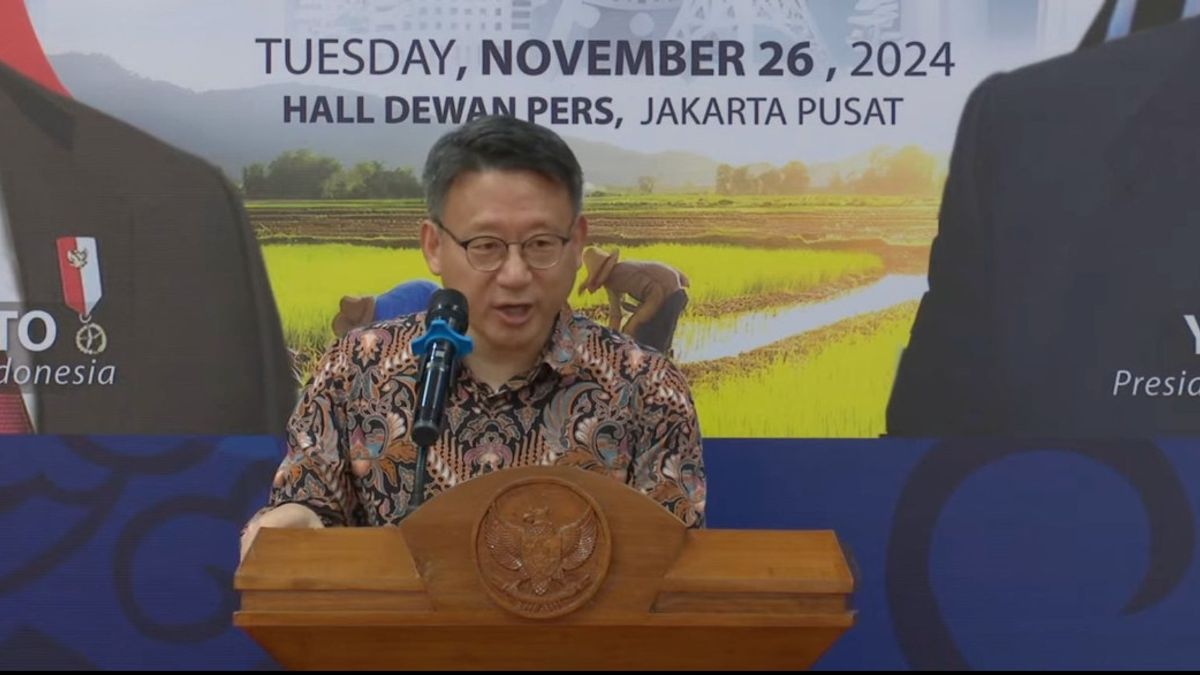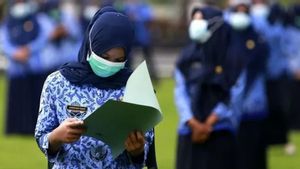JAKARTA — The Indonesian government's desire to achieve food self-sufficiency is faced with a number of challenges that are not easy. These challenges include a population increase of 1.1% per year, stagnant food production and even a decline in the 2019-2024 period of 1.1%.
In addition, in 2023, dependence on rice imports of 3.1 million tons was also recorded. Another challenge is the degradation of land quality where 89.5% of land is not sustainable. Not to mention the aging age of farmers, where 70% of farmers are over 43 years old.
The low level of farmer welfare and climate change that disrupts the planting and harvesting process are also serious obstacles.
This was stated by the Deputy for Administration and Distribution of the Coordinating Ministry for Food, Tatang Yuliono, when speaking at an international seminar themed "Improving Indonesia-Korea Relationship in Prabowo Administration from Food Sovereignty to Good Neighbor" held by the Indonesian Cyber Media Network (JMSI) at the Press Council Hall, Jalan Kebon Sirih, Jakarta, Tuesday, November 26, 2024.
This discussion was held with the consideration that the two keywords of Prabowo Subianto's government policy are closely related to each other. Food sovereignty makes Indonesia have the maximum ability to play a free foreign policy and at the same time be a good neighbor.
"Another challenge faced by Indonesia is food waste. According to the United Nations Environment Program (UNEP) report entitled Food Waste Index 2021, the total food waste in Indonesia reaches 20.93 million tons per year. This value is in the fourth largest position after China, India, and Nigeria," explained Tatang Yuliono.
He added that President Prabowo Subianto is well aware of these challenges and therefore in his inaugural speech emphasized that Indonesia must achieve self-sufficiency in energy, water and food within the next four years.
"For this reason, the government has formed the Coordinating Ministry for Food. This ministry coordinates four ministries, namely the Ministry of Agriculture, the Ministry of Forestry, the Ministry of Environment, the Ministry of Maritime Affairs and Fisheries, and two agencies, namely the National Food Agency and the National Nutrition Agency, as well as other necessary institutions," he said again.
Furthermore, Tatang Yuliono said that the government's main target is to increase the food security index from 76.20 (2024) to 80.72 (2029), then reduce the prevalence of inadequate food consumption from 7.21% (2024) to 4.41% (2029), as well as increase food production and reduce food imports for rice, corn, soybeans and sugar commodities.
South Korea Lends a Hand
Meanwhile, South Korean Deputy Ambassador Park Soo-Deok said that his party is ready to develop cooperation in the agricultural sector to support Indonesia's food self-sufficiency target. The two countries, he said, have established so much cooperation in various fields, politics, economy, education, culture, and people to people contact since diplomatic relations began in the 1970s.
He continued, in the last 20 years the two countries have recorded a significant increase in relations. Two decades ago, the trade volume between the two countries was less than 10 billion US dollars. While last year the trade volume between the two countries was recorded at more than 20 billion US dollars.
Last year, more than 300 thousand Indonesians visited Korea, and more than 200 thousand Koreans visited Indonesia. Korean companies invited around 10 thousand Indonesian workers and no less than 2,000 Indonesian students to study in Korea.
Hyungjun Noh from the Korea Program for International Cooperation in Agricultural (KOPIA) at the Korean Village Development Agency offered cooperation to help the productivity of the agricultural sector in Indonesia.
In his presentation, Noh gave examples of cooperation that KOPIA has carried out in various countries in Asia, Africa, and Latin America. Last August, Noh visited Indonesia to see up close the problems faced by the Indonesian agricultural sector.
These problems include a 50 percent decrease in fertilizer volume, the inability of around 17-20% of farmers to access the Farmer Card, a decrease in seed quality, very poor mechanization and automation, and inadequate irrigation, where more than 50 percent must be repaired. Weather factors such as El Nino also disrupt the planting and harvest seasons. In addition, the number of Field Extension Officers (PPL) can only help 50% of farmers and farmer groups.
Noh is confident that cooperation within the KOPIA framework can significantly help Indonesia increase agricultural land productivity, including helping to realize the 3 million hectare rice field program.
Meanwhile, Deputy for Maritime Affairs and Natural Resources of the Ministry of National Development Planning, Vivi Yulaswati, said that Indonesia also set a target in 2045 to have a competitive, innovative, and resilient agricultural sector that provides decent and good job opportunities for farmers and other agricultural workers. The agricultural sector at that time is also expected to support a dynamic agrifood system that provides a healthy diet for everyone, and improves environmental sustainability.
To achieve this target, a resilient food system and governance are needed at the regional and local levels, diversity in production and consumption, and food system logistics, healthy diets that form diverse foods, and decentralized planning and decision-making processes.
Vivi also expressed her belief that cooperation with South Korea could encourage various steps needed to achieve the target of food self-sufficiency.
The English, Chinese, Japanese, Arabic, and French versions are automatically generated by the AI. So there may still be inaccuracies in translating, please always see Indonesian as our main language. (system supported by DigitalSiber.id)













